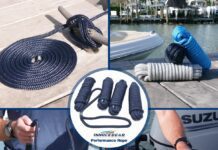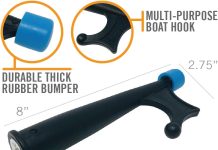Thinking about investing in an inflatable dock, but not sure if it’s worth the hype? Look no further! In this article, we explore the pros and cons of inflatable docks, shedding light on whether they truly live up to their reputation. From their ease of use and portability to their durability and stability, we weigh the benefits against potential drawbacks, so you can make an informed decision on whether an inflatable dock is a worthy addition to your waterfront adventures.
What are Inflatable Docks?
Definition
Inflatable docks, also known as inflatable platforms or floating docks, are portable and versatile water platforms designed to provide a stable and safe surface for various water activities. These docks are made from durable materials, such as PVC or military-grade rubber, and can be inflated and deflated for easy transport and storage.
Materials
Inflatable docks are typically constructed using high-quality materials that are resistant to wear and tear. PVC (Polyvinyl Chloride) and military-grade rubber are commonly used due to their durability and ability to withstand harsh weather conditions and UV exposure. These materials ensure that the inflatable docks can withstand repeated use without puncturing or deflating.
Types
There are several types of inflatable docks available in the market to cater to different needs and preferences. The most common types include single-person inflatable docks, family-sized inflatable islands, and inflatable platforms with integrated seating areas. Some inflatable docks also come with built-in accessories such as cup holders, canopy tops, and even inflatable slides for added fun and convenience.
Advantages of Inflatable Docks
Portability
One of the significant advantages of inflatable docks is their portability. These docks can be easily deflated and packed into a compact size, making them convenient to transport to different locations. Whether you want to take it on a weekend boating trip, to a lake house, or to a beach vacation, inflatable docks offer the flexibility to enjoy water activities wherever you go.
Ease of Use
Using an inflatable dock is incredibly easy and straightforward. The process usually involves inflating the dock using an air pump, securing it in place, and then enjoying your time on the water. Inflatable docks often come with user-friendly inflation and deflation valves, allowing for quick setup and take-down. Additionally, many inflatable docks are designed to be self-bailing, ensuring that any water that accumulates on the dock will drain away, keeping the surface dry and comfortable.
Versatility
Inflatable docks are highly versatile water platforms that can be used for various activities. Whether you want to relax and sunbathe, swim, play water games, or even practice yoga, an inflatable dock provides a stable and safe surface for all these activities. Additionally, inflatable docks can be connected together to create larger platforms, allowing for social interaction and creating a central gathering point for friends and family.
Durability
Contrary to common belief, inflatable docks are built to withstand rugged use and harsh outdoor elements. The use of durable materials and reinforced seams ensures that these docks can handle heavy loads and rough waters without puncturing or deflating. However, it is still recommended to exercise caution and avoid sharp objects that may pose a puncture risk.
Disadvantages of Inflatable Docks
Puncture Risk
While inflatable docks are designed to be durable, there is always a slight risk of puncture when used in water environments. Sharp objects such as rocks, fishing hooks, or even pet claws can potentially cause damage to the inflated surface. However, manufacturers often provide repair kits that allow users to fix small punctures quickly, ensuring that the dock can continue to be used safely.
Stability
Inflatable docks may have limited stability compared to traditional fixed docks. While they provide a stable surface for most water activities, the nature of the inflatable design can make them slightly more susceptible to shifting movements or waves. It is essential to anchor the inflatable dock properly to ensure stability and minimize any potential rocking motion.
Limited Weight Capacity
Another drawback of inflatable docks is their limited weight capacity compared to traditional docks. The inflatable nature of these docks restricts their ability to support heavy loads, and exceeding the weight capacity can lead to decreased stability or even punctures. It is crucial to adhere to the specified weight limits provided by the manufacturer to ensure the safety and longevity of the inflatable dock.
Factors to Consider before Buying
Intended Use
Before purchasing an inflatable dock, it is important to determine its intended use. Consider whether it will be used primarily for recreational purposes, boat docking, waterfront parties and events, or fishing. Understanding the specific activities you plan to engage in will help determine the size, weight capacity, and additional features required for the inflatable dock.
Quality of Materials
When choosing an inflatable dock, it is vital to consider the quality of materials used in its construction. Opt for docks made from durable, puncture-resistant materials such as PVC or military-grade rubber. Additionally, look for reinforced seams and sturdy inflation valves that ensure the dock’s longevity and resistance to wear and tear.
Inflation and Deflation Process
Evaluate the ease of the inflation and deflation process of the inflatable dock. Look for docks with user-friendly valves and compatible air pumps that allow for quick and hassle-free setup. Additionally, consider the time it takes to inflate and deflate the dock, as well as the size of the packed dock for ease of transportation and storage.
Budget
Set a budget for purchasing an inflatable dock and consider the available options within that price range. While it is essential to invest in a high-quality and durable dock, there are options available to suit different budgets. Consider the features, size, and additional accessories that come with the inflatable dock to determine its value for money.
Comparing Inflatable Docks to Traditional Docks
Cost
Inflatable docks generally offer a more affordable option compared to traditional fixed docks. The cost of purchasing and installing a traditional dock can be significantly higher due to the need for construction materials, labor, and permits. On the other hand, inflatable docks provide a budget-friendly alternative without compromising on functionality and convenience.
Installation
The installation process for traditional docks can be time-consuming and requires professional assistance. It often involves constructing and securing the dock to the waterbed, which can be costly and disruptive to the surrounding environment. In contrast, inflatable docks can be easily inflated, secured, and ready for use within a short period of time, without the need for extensive construction or specialized tools.
Maintenance
Traditional docks often require regular maintenance to prevent corrosion, rotting, and other forms of deterioration. This can involve routine inspections, repairs, and the application of protective coatings. Inflatable docks, on the other hand, require minimal maintenance. They can be cleaned easily with mild soap and water, and any minor punctures can be repaired using the provided repair kits.
Customization Options
Traditional docks provide more customization options compared to inflatable docks. With traditional docks, you can incorporate features such as built-in seating, storage compartments, and even electrical outlets. Inflatable docks, while they may offer some additional features such as cup holders or canopy tops, may have limited customization options due to their inflatable design.
Suitable Applications for Inflatable Docks
Recreational Use
Inflatable docks are perfect for recreational use, providing a fun and safe platform to enjoy the water. Whether it’s simply lounging under the sun, swimming, or engaging in water sports activities, inflatable docks offer a versatile and enjoyable experience for individuals of all ages.
Boat Docking
Inflatable docks can also serve as temporary boat docks, especially in locations where traditional fixed docks are not available or feasible. These docks provide a convenient and stable surface for docking smaller boats, kayaks, or paddleboards, allowing for easy embarkation and disembarkation.
Waterfront Parties and Events
Hosting a waterfront party or event becomes much more exciting with the addition of an inflatable dock. These docks offer a central gathering point, providing ample space for socializing, lounging, and even setting up additional entertainment features such as inflatables or water slides.
Fishing
Inflatable docks can also be a great asset for fishing enthusiasts. They provide a stable and comfortable platform for casting lines and reeling in catches. In addition, the portability of these docks allows fishermen to easily move to different locations and explore different fishing spots.
Top Brands and Models
Brand A: Model X
Brand A offers Model X, a high-quality inflatable dock that is known for its durability and stability. It is constructed using military-grade rubber and features reinforced seams for added strength. Model X has a weight capacity of up to 600 pounds and comes with built-in cup holders and a detachable sunshade.
Brand B: Model Y
Model Y by Brand B is a versatile inflatable dock suitable for various water activities. It is made from rugged PVC material and has a weight capacity of 800 pounds, making it suitable for larger gatherings and boat docking. Model Y also features multiple inflation valves for quick and easy setup.
Brand C: Model Z
Model Z from Brand C is a compact and portable inflatable dock designed for single-person use. It is made from high-quality PVC material and comes with a convenient carrying bag for easy transportation. Model Z is ideal for solo water adventures or a peaceful getaway on the water.
Customer Reviews
Positive Reviews
Many customers who have purchased inflatable docks have expressed their satisfaction with the product. They appreciate the portability and ease of use, allowing them to bring the dock to various destinations and set it up quickly. Customers also praise the durability and stability of the docks, stating that they have withstood rough waters and heavy usage without puncturing or losing air.
Negative Reviews
Some customers have mentioned concerns about the puncture risk associated with inflatable docks. While most punctures can be easily repaired using the provided repair kits, some customers have experienced difficulties in fixing larger tears or damages. Additionally, a few customers have mentioned stability issues in rougher waters, emphasizing the importance of proper anchoring and weight distribution.
Overall Satisfaction
Overall, customers are highly satisfied with their inflatable docks, appreciating the convenience, versatility, and budget-friendly nature of these water platforms. The majority of customers believe that the advantages of inflatable docks far outweigh the potential disadvantages, making them a worthwhile investment for those who enjoy water activities and seek portable and easy-to-use solutions.
Safety Tips for Using Inflatable Docks
Proper Anchoring
To ensure stability and minimize movement, it is crucial to properly anchor the inflatable dock. Use suitable anchor systems, such as sandbags, ropes, or stakes, based on the specific environment and conditions. Proper anchoring will help prevent the dock from drifting or tipping over, keeping users safe.
Monitoring Weather Conditions
It is essential to monitor weather conditions before and during the use of an inflatable dock. Strong winds, thunderstorms, or rough waters can pose potential risks and compromise the safety of the dock. If adverse weather conditions arise, it is recommended to deflate and secure the dock until conditions improve.
Weight Distribution
To maintain stability and prevent capsizing, distribute weight evenly on the inflatable dock. Avoid exceeding the weight capacity specified by the manufacturer as overloading can compromise stability and increase the risk of puncture or deflation. Proper weight distribution will ensure a safe and enjoyable experience on the water.
Conclusion
Inflatable docks offer a versatile and portable solution for enjoying water activities. With their ease of use, durability, and affordable price points, these docks have gained popularity among water enthusiasts. While there are some drawbacks to consider, such as puncture risk and limited weight capacity, proper care and attention to safety guidelines can mitigate these concerns. Whether used for recreational purposes, boat docking, or hosting waterfront events, inflatable docks provide a stable and enjoyable platform for water adventures. With various brands and models available in the market, individuals can choose the inflatable dock that best suits their needs and preferences, ensuring countless hours of fun on the water.



































